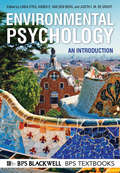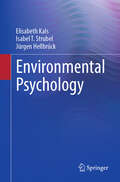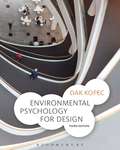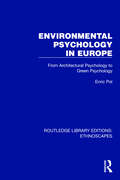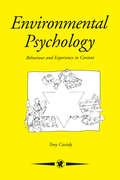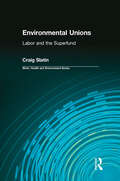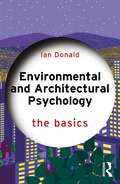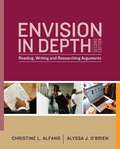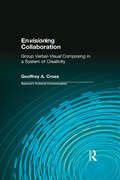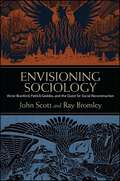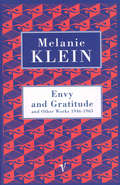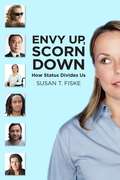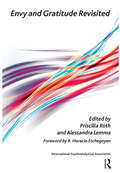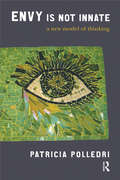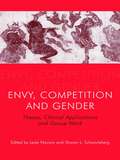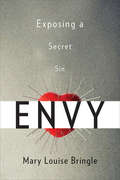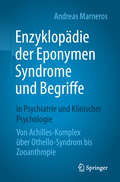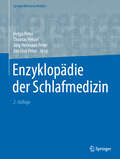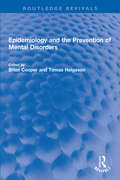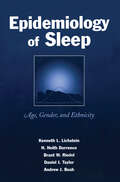- Table View
- List View
Environmental Psychology
by Linda Steg Agnes E. van den Berg Judith I. de GrootEnvironmental Psychology: An Introduction offers a research-based introduction to the psychological relationship between humans and their built and natural environments and discusses how sustainable environments can be created to the benefit of both people and natureExplores the environment's effects on human wellbeing and behaviour, factors influencing environmental behaviour and ways of encouraging pro-environmental actionProvides a state-of-the-art overview of recent developments in environmental psychology, with an emphasis on sustainability as a unifying principle for theory, research and interventionsWhile focusing primarily on Europe and North America, also discusses environmental psychology in non-Western and developing countriesResponds to a growing interest in the contribution of environmental psychologists to understanding and solving environmental problems and promoting the effects of environmental conditions on health and wellbeing
Environmental Psychology
by Andrew S. Baum Paul A. Bell Thomas C Greene Jeffrey D. FisherBell et al’s Environmental Psychology is considered to be the most authoritative textbook available for this course. It is the only environmental psychology book to appear in five editions. It is noted for its focus on the application of science and theory to the solution of problems involving natural and altered environments. The book reviews the application of practical solutions to everyday environmental problems. The authors integrate theory, research, and application using their unifying, eclectic model to demonstrate human-environment interaction. The book reviews how we are a product of our environment, our biology, and the interaction of the two. It discusses how our physical environment such as noise and weather impact us. It also reviews how we can modify our environment through design principles such as aesthetics, and how we modify our environment when we disregard the impact other people and/or elements have on our ecological system. Each chapter addresses both micro and macro- environmental influences, including the short- and long-term effects of both. <P><P>The opening chapter provides a historical context and introduces the reader to the research methods central to the discipline. The next 4 chapters introduce environmental attitudes, values, and ethics and the principles that apply to environmental assessment; models of perception & cognition, including how we process and store environmental information; and the major theories of human-environment interaction. The next 6 chapters explore a variety of environmental influences such as noise, climate, natural disasters (including the effects of pollution), crowding, and city life, and how they impact us. The next 2 chapters examine how environmental psychology principles can be applied to residences, institutional settings (i.e.schools) and work and leisure environments. The book concludes with a chapter on how we can change behavior that harms the environment. The book is intended as a text for courses on environmental psychology, environment and behavior, social ecology, architectural psychology, ecological psychology or environmental design or studies, taught in departments of psychology, sociology, environmental science, and biology.
Environmental Psychology
by Elisabeth Kals Jürgen Hellbrück Isabel T. StrubelEnvironmental Psychology deals with human-environment interactions as relationships between the physical-material and sociocultural outer world, as well as human experience and behavior. This fully revised second edition provides a well-structured, clearly understandable overview of the topics and developments of this increasingly significant sub-discipline of psychology and makes it clear that environmental psychology is a highly relevant field of research and application in the present and future.
Environmental Psychology for Design
by Dak KopecHow does a room affect an occupant's behavior and well-being? How does a building influence its residents' health? Environmental Psychology for Design, 3rd Edition, explores these questions with an in-depth look at psychosocial responses to the built environment. Awarded the 2006 ASID Joel Polsky Prize, the first edition served as an introduction to the discipline of environmental psychology and inspired readers to embrace its key concepts and incorporate them into their practice. This 3rd edition continues to analyze the interaction between environments and human behavior and well-being, while exploring how individual differences related to age, gender, and cultural background impact that interaction.
Environmental Psychology in Europe: From Architectural Psychology to Green Psychology (Routledge Library Editions: Ethnoscapes)
by Enric PolOriginally published in 1993, as part of the Ethnoscapes: Current Challenges in the Environmental Social Sciences series, reissued now with a new series introduction and new preface, Environmental Psychology in Europe: From Architectural Psychology to Green Psychology sets out to explain the nature of environmental psychology, how it was born, how it developed, what were its dominant subjects, its principal actors and its present state in Europe at the time. The volume covers each European country, looking at the origin and development of the subject in the principal European cultural areas.
Environmental Psychology: An Introduction (BPS Textbooks in Psychology)
by Judith I. de GrootThe updated edition of the essential guide to environmental psychology Thoroughly revised and updated, the second edition, Environmental Psychology: An Introduction offers an overview of the interplay between humans and their environments. The text examines the influence of the environment on human experiences, behaviour and well-being and explores the factors influencing environmental behaviour, and ways to encourage pro-environmental behaviour. The revised edition is a state-of-the art review of relevant theories and research on each of these topics. With contributions from an international panel of noted experts, the text addresses a wealth of topics including the main research methods in environmental psychology; effects of environmental stress; emotional impacts and meanings of natural environment experience; aesthetic appraisals of architecture; how to measure environmental behaviour; cognitive, emotional and social factors explaining environmental behaviour; effects and acceptability of strategies to promote pro-environmental factors; and much more. This important book: Discusses the environmental factors that threaten and promote human wellbeing Explores a wide range of factors influencing actions that affect environmental conditions Discusses the effects and acceptability of approaches that aim to encourage pro-environmental behavior Presents research results conducted in different regions in the world Contains contributions from noted experts Written for scholars and practitioners in the field, the revised edition of Environmental Psychology offers a comprehensive review of the most recent research available in environmental psychology.
Environmental Psychology: Behaviour and Experience In Context (Contemporary Psychology Ser.)
by Tony CassidyThis text contains an up-to-date survey of theory, research and practice in environmental psychology, drawing on international literature. It adopts the perspective that physical and social factors are inextricably linked in their influence on human behaviour and experience and that the world in which we live is changed and often damaged by human action.; Throughout the text, the issues which are important in contemporary psychology, such as levels of explanation, methodological diversity and the relationship between psychology and other disciplines, are brought to the fore. The text covers established areas of environmental concern and also brings together research on rarely covered topics, such as the effects of smell, colour and light, and the way in which physical environments influence social identity.
Environmental Unions: Labor and the Superfund (Work, Health and Environment Series)
by Craig SlatinDuring the 1970s and 1980s, a hazardous waste management industry emerged in the U.S., driven by government and polluting industry responses to a hazardous waste crisis. In 1979, labor unions began to seek federal health and safety protections for workers in that industry and for firefighters responding to hazardous materials fires. Those efforts led to a worker health and safety section in the Superfund Amendments and Reauthorization Act of 1986. The legislation mandated regulation of hazardous waste operations and emergency response worker protection, and establishment of a national health and safety training grant program - which became the Worker Education and Training Program (WETP).Craig Slatin provides a history of labor's success on the coattails of the environmental movement and in the middle of a rightward shift in American politics. He explores how the WETP established a national worker training effort across industrial sectors, with case studies on the health and safety training programs of two unions in the WETP - the Oil, Chemical, and Atomic Workers and the Laborers' Union. Lessons can be learned from one of the last major worker health and safety/environmental protection victories of the 1960s-1980s reform era, coming at the end of the golden age of regulation and just before the new era of deregulation and market dominance. Slatin's analysis calls for a critical survey of the social and political tasks facing those concerned about worker and community health and environmental protection in order to make a transition toward just and sustainable production.
Environmental and Architectural Psychology: The Basics (The Basics)
by Ian DonaldEnvironmental and Architectural Psychology: The Basics is a jargon-free and accessible introduction to the relationship between people and their natural and built environment. Exploring everything from the effectiveness of open plan offices to how people respond to life-threatening disasters, the book addresses issues around sustainability, climate change, and behaviour, and is grounded in theory and ideas drawn from psychology, geography, and architecture. Author Ian Donald introduces both the theoretical underpinnings and the applications of environment-behaviour research to solving real world problems, encouraging readers to reflect on the role of design and policy in shaping the environments in which they live and work. With chapters considering the impact of environment on identity, wellbeing, crime, and spatial behaviour, Donald shows us not only how people shape and affect the environment, but also in turn how the environment shapes and affects people’s thoughts, feelings, and behaviours. Addressing some of the most important questions of our time, including how behaviour drives climate change, and what we can do about it, this is the ideal book for anyone interested in the interactions between architecture, the environment, and psychology.
Environmental and Sustainability Education in Teacher Education: Canadian Perspectives (International Explorations in Outdoor and Environmental Education)
by Douglas D. Karrow Maurice DiGiuseppeThis book was inspired by the inaugural National Roundtable on Environmental and Sustainability Education in Canadian Faculties of Education (Roundtable 2016), which took place June 14-16, 2016, at Trent University in Peterborough, Ontario. Roundtable 2016 brought together over seventy participants from across Canada, including educators, researchers, policy-makers, consultants, and community organizations. Over the course of three days, participants took part in keynote addresses, research colloquia, networking socials, and collaborative inquiry activities focused on Environmental Sustainability Education in Teacher Education (ESE-TE). Roundtable 2016 resulted in the publication of a National Action Plan containing action-oriented recommendations for enhancing ESE-TE, and a position statement titled “The Otonabee Declaration,” where delegates articulated their views regarding environmental degradation, the critical need for enhancing ESE-TE, and, the role educators, children, youth, educational institutions, policy makers, and Indigenous communities play in enhancing ESE-TE in Canada. This volume concludes with a discussion placing current Canadian ESE-TE theory and practice within an international context.
Envision In Depth: Reading, Writing, and Researching Arguments
by Christine Alfano Alyssa O'BrienEnvision in Depth: Reading, Writing, and Researching Arguments 2/e, is a combined rhetoric and reader intended for composition courses focusing on argumentation and research-based writing. Taking contemporary culture as its central theme and context, Envision in Depth is concerned with the fundamentals of analyzing and writing powerful, effective arguments. Students using Envision in Depth will learn how to analyze and compose arguments, design and conduct research projects, and produce persuasive visual and oral presentations in response to over 100 contemporary arguments in a wide range of verbal and visual genres.
Envisioning Collaboration: Group Verbal-visual Composing in a System of Creativity (Baywood's Technical Communications)
by Geoffrey A. Cross Charles H. SidesThe dissemination of desktop publishing and web authoring software has allowed nearly everyone in industrialized countries to combine verbal and visual symbols into text. Serious multimodal projects often demand extensive teamwork, especially in the workplace. But how can collaboration engaging such different traditions of expression be conducted effectively? To address this question, Envisioning Collaboration traces the composing processes of expert graphic artists and writers preparing advertising campaigns to retain a vital national account. It examines the influences on individual and dyadic composing processes of what Csikszentmihalyi terms "the domain," in this case the disciplinary knowledge of advertising, and "the field," in this case the surrounding economic conditions and client, vendor, customer, and agency executive gatekeepers. Based on a 460-hour participant-observation and intensive computerized data analysis, Envisioning Collaboration is the first book to meticulously examine collaborative creative processes at an award-winning advertising agency, including audience analysis, branding, collaborative "moves," power and conflict management, uses of humor, degree of mindfulness, and effectiveness. The findings indicate the role of concepts in generating common texts by artists and writers, the role of the visual in individuals' composing, verbal-visual rhetorical elements in processes and products, and which verbal-visual techniques were most generative. Findings are related to pertinent research in technical and business writing, rhetoric and composition, and some key research in visual design, communication, advertising, neurolinguistics, management, and psychology. The book concludes with a pedagogical/training unit incorporating "gateway activities" for effective verbal-visual composition and collaboration.
Envisioning Sociology: Victor Branford, Patrick Geddes, and the Quest for Social Reconstruction (SUNY Press Open Access)
by John Scott Ray BromleyEnvisioning Sociology is a landmark work, the first major study of the founding of sociology in Britain and the enormous contributions made by the intellectual circle led by Victor Branford and Patrick Geddes. Authors John Scott and Ray Bromley chronicle the biographical connections and personal partnerships of the circle's key participants, their international connections, their organization-building work, and the business activities that underpinned their efforts. Branford and Geddes fashioned an ambitious and wide-ranging interdisciplinary vision, drawing on geography, anthropology, economics, and urban planning, in addition to sociology. This vision was an integral part of a project of social reconstruction, a "third way" eschewing both liberalism and communism in favor of cooperation, redistribution, and federalism. Envisioning Sociology uncovers a previously hidden history of the social sciences, giving readers a fascinating glimpse into early twentieth-century social science and political economy, while demonstrating the contemporary relevance of the ideas of these underrated figures. Although Branford and Geddes failed to establish the grand sociology they envisioned, their ideas helped develop the theory and practice of community development, participatory democracy, bioregionalism, historic preservation, and neighborhood upgrading.SUNY Press has collaborated with Knowledge Unlatched to unlock KU Select titles. The Knowledge Unlatched titles have been made open access through libraries coming together to crowd fund the publication cost. Each monograph has been released as open access making the eBook freely available to readers worldwide. Discover more about the Knowledge Unlatched program here: https://www.knowledgeunlatched.org/, and access the book online at the SUNY Open Access Repository at <a href="http://hdl.handle.net/20.500.12648/8479 ">http://hdl.handle.net/20.500.12648/8479 .
Envisioning the Dream Through Art and Science: With 100 Digitally Imaged Dreams (Imagery and Human Development Series)
by Robert G. Kuzendorf James VeatchThis monograph is the product of an interdisciplinary experiment--an artistic experiment and a psychological experiment--focused on dreams. Inspired by the prevalence of dream imagery and "dream logic" in surrealist art, the authors asked 100 art students to create digital images representing critical scenes from one of their dreams, then to create a surrealist collage from the digital images. The resulting collages tend to capture the surreality envisioned in actual works of surrealist art, as two collages included in the book illustrate. Inspired also by the psychological problem of studying other minds, the authors asked the 100 art students to describe their dream in writing, to interpret their dream, and to complete two personality measures: the Short Form of the Boundary Questionnaire and the Brief Symptom Inventory. The art students' scores on particular personality scales were found to be statistically associated with particular dream aspects, many of which are visually observable in the digitized dream images created by art students with particular personalities but are not verbally discernible in the dream descriptions written by those same students. The appendix contains, for each art student, the digitally imaged dream, the written description and written interpretation of the dream, and scores on the Boundary Questionnaire and on the depression, anxiety, hostility, and somatization scales of the Brief Symptom Inventory. The book concludes with a bibliography and an index to some of the visual elements in the 100 digitized dream images.
Envy And Gratitude And Other Works 1946-1963: A Study Of Unconscious Sources
by Melanie KleinA perfect introduction to Melanie Klein’s modern neuroscientific research. Melanie Klein's writings, particularly on infant development and psychosis, have been crucial both to theoretical work and to clinical practice. Envy and Gratitude collects her writings from 1946 until her death in 1960, including two papers published posthumously. Klein's major paper, 'Notes on Some Schizoid Mechanisms', introduces the concept of the paranoid-schizoid position, in which the infant ego splits, projects and introjects its objects - most particularly the mother - during the first few months of life. Envy and Gratitude, her last major work, introduces her theory of primary envy.
Envy Up, Scorn Down: How Status Divides Us
by Susan T. FiskeAn insightful examination of why we compare ourselves to those above and below us. The United States was founded on the principle of equal opportunity for all, and this ethos continues to inform the nation’s collective identity. In reality, however, absolute equality is elusive. The gap between rich and poor has widened in recent decades, and the United States has the highest level of economic inequality of any developed country. Social class and other differences in status reverberate throughout American life, and prejudice based on another’s perceived status persists among individuals and groups. In Envy Up, Scorn Down, noted social psychologist Susan Fiske examines the psychological underpinnings of interpersonal and intergroup comparisons, exploring why we compare ourselves to those both above and below us and analyzing the social consequences of such comparisons in day-to-day life. What motivates individuals, groups, and cultures to envy the status of some and scorn the status of others? Who experiences envy and scorn most? Envy Up, Scorn Down marshals a wealth of recent psychological studies as well as findings based on years of Fiske’s own research to address such questions. She shows that both envy and scorn have distinctive biological, emotional, cognitive, and behavioral characteristics. And though we are all “wired” for comparison, some individuals are more vulnerable to these motives than others. Dominant personalities, for example, express envy toward high-status groups such as the wealthy and well-educated, and insecurity can lead others to scorn those perceived to have lower status, such as women, minorities, or the disabled. Fiske shows that one’s race or ethnicity, gender, and education all correlate with perceived status. Regardless of whether one is accorded higher or lower status, however, all groups rank their members, and all societies rank the various groups within them. We rate each group as either friend or foe, able or unable, and accordingly assign them the traits of warmth or competence. The majority of groups in the United States are ranked either warm or competent but not both, with extreme exceptions: the homeless or the very poor are considered neither warm nor competent. Societies across the globe view older people as warm but incompetent. Conversely, the very rich are generally considered cold but highly competent. Envy Up, Scorn Down explores the nuances of status hierarchies and their consequences and shows that such prejudice in its most virulent form dehumanizes and can lead to devastating outcomes—from the scornful neglect of the homeless to the envious anger historically directed at Tutsis in Rwanda or Jews in Europe. Individuals, groups, and even cultures will always make comparisons between and among themselves. Envy Up, Scorn Down is an accessible and insightful examination of drives we all share and the prejudice that can accompany comparison. The book deftly shows that understanding envy and scorn—and seeking to mitigate their effects—can prove invaluable to our lives, our relationships, and our society.
Envy and Gratitude Revisited (The International Psychoanalytical Association Psychoanalytic Ideas and Applications Series)
by Alessandra Lemma R. Horacio Etchegoyen Priscilla RothThese stimulating essays are evidence that 50 years after its publication Melanie Klein's Envy and Gratitude is still a rich source of psychoanalytic inspiration. Sixteen highly regarded analysts, representing a wide range of psychoanalytic thinking, provide new insights and highlight current developments without avoiding the controversies that surround the original publication. The clinical and literary material is engaging and illustrates the effect of theory on practice and the influence of practice on the evolution of theory.Contents:Foreword - R. Horacio EtchegoyenIntroduction - Priscilla Roth1) "Even now, now, very now . . ." On envy and the hatred of love - Ignes Sodre2) Envy, narcissism, and the destructive instinct - Robert Caper3) Envy and Gratitude: some current reflections - H. Shmuel Erlich4) An independent response to Envy and Gratitude - Caroline Polmear5) On gratitude - Edna O'Shaughnessy6) Keeping envy in mind: the vicissitudes of envy in adolescent motherhood - Alessandra Lemma7) Envy in Western society: today and tomorrow - Florence Guignard8) He thinks himself impaired: the pathologically envious personality - Ronald Britton9)
Envy is Not Innate: A New Model of Thinking (Forensic Psychotherapy Monograph Ser.)
by Patricia PolledriThis book is a comprehensive revision of the notion of envy, suggesting that envy is not innate and proposing some fresh ideas about its relation to psychopathology, offering a working model of development which is highly relevant to clinical practice.
Envy, Competition and Gender: Theory, Clinical Applications and Group Work
by Leyla Navaro Sharan L. SchwartzbergEnvy, Competition and Gender provides a unique perspective on gender difference in relation to envy and competitiveness, reframing and de-demonizing these difficult emotions and revealing their potentially creative power. Incorporating perspectives from psychology, psychiatry, social work, sociology and education, this book provides a comprehensive overview of theories and ideas on the links between gender, envy and competition. The book is divided into three sections, covering the individual and development, therapeutic implications and therapeutic applications in broader social and cultural contexts. Individual and group case stories are included throughout to illuminate discussion of crucial issues such as: men, masculinity, and competition gender differences in envying and being envied the evolution of the female self envy and generativity: owning our inner resources envy in body transference and countertransference envy and desire revenge and retaliation. This interdisciplinary, multicultural and international perspective on envy and competition in relation to gender will be of great interest to all psychotherapists and related mental health professionals interested in investigating the positive potential of these powerful emotions.
Envy: Exposing A Secret Sin
by Mary Louise BringleThe world has changed since the early Christian theologians named envy as one of the seven deadly sins, but it seems that the human heart has stayed much the same. Envy: Exposing a Secret Sin by Mary Louise Bringle finds that what once was viewed as destructive to the soul is now desirous. From the Texas woman who tried to kill the mother of her daughter's rival for a position on the cheerleading squad to the market's use of envy to sell everything from cars to cat food, the "green-eyed monster" is alive and well. Perhaps the only thing that's changed is our attitude to envy. <p><p> In this illuminating and lively volume, Bringle examines the evolution of envy from something to be avoided to something to be achieved. Drawing on a variety of sources from Gregory the Great to Cinderella, from Hieronymous Bosch to Vogue magazine, she explores ways to avoid the dangers of envy by reminding us of the ancient cure for this disease of the soul: gratitude.
Enzyklopädie der Eponymen Syndrome und Begriffe in Psychiatrie und Klinischer Psychologie: Von Achilles-Komplex über Othello-Syndrom bis Zooanthropie
by Andreas MarnerosEponyme Bezeichnungen haben den großen praktischen Vorteil, dass sie komplexe Begriffe und Konstellationen mit einer einzigen Bezeichnung erfassen. Das bietet Ärztinnen und Ärzten, Psychologinnen und Psychologen als auch Studierenden eine nicht zu unterschätzende Gedächtnishilfe. Zudem steht hinter einem psychiatrischen oder psychologischen Eponym nicht nur ein klinisches Bild oder eine psychopathologische Konstellation, sondern auch ein Mythos, eine Geschichte oder eine Biographie, sprich ein kultureller Hintergrund. Eine Expedition in das Reich der Eponyme bedeutet daher nicht nur die Begegnung mit Wissen, sondern auch eine Berührung mit alter und neuer Kultur. Jeder Begriff wird sowohl in seinem psychiatrisch-psychologischen Kontext als auch in seinem kulturellen Ursprung erläutert. So ergibt sich ein spannendes Gesamtbild aus bekannten und eher unbekannten Eponymen und Syndromen, die alle eine Geschichte erzählen.
Enzyklopädie der Schlafmedizin (Springer Reference Medizin)
by Thomas Penzel Helga Peter Jörg Hermann Peter Jan Giso PeterDas Wissen um Grundlagen, Diagnostik und die effiziente Behandlung von Schlafstörungen und schlafmedizinischen Erkrankungen wird von mehr als 100 Autorinnen und Autoren aus allen beteiligten Fachgebieten umfassend dargestellt. Die 285 ausführlichen Beiträge zu den zentralen Themen und Fragestellungen wurden in der 2. Auflage aktualisiert; sie werden durch über 650 kurze und präzise Definitionen weiterer Begriffe ergänzt. Häufige symptomatische Schlafstörungen u.a. in Psychiatrie, Neurologie, Innerer Medizin, HNO-Heilkunde, Dermatologie, Zahnheilkunde, Gynäkologie und Geburtshilfe sind im Kontext der Grunderkrankungen ausführlich berücksichtigt, ebenso Zusammenhänge mit Schmerz und mit dem Lebensalter, Aspekte der Prävention, der Begutachtung und der Auswirkungen auf das Arbeitsleben, sowie Wirkungen und Nebenwirkungen von häufig verordneten Medikamenten auf Wachheit und Schlaf. Ein umfassendes Nachschlagewerk für alle in Medizin, Psychologie und Fachberufen im Gesundheitswesen Tätigen, die von Patientinnen und Patienten mit gestörtem Schlaf oder beeinträchtigender Tagesschläfrigkeit konsultiert werden.
Epidemiology and the Prevention of Mental Disorders (Routledge Revivals)
by Brian Cooper To 769 Mas HelgasonFirst published in 1989, Epidemiology and the Prevention of Mental Disorders examines the research undertaken into the methods for studying the occurrence of mental illness in populations during the twenty years prior to publication. The book explores the incidence and distribution of conditions such as schizophrenia, depression, alcoholism, addiction, and dementia across populations, and the risk factors with which they are associated. Taking a public health approach to the prevention of mental illness, the book reports on epidemiological research in psychiatry, emphasising its use in preventative terms, and making connections between its use in psychiatry and its use in other fields of medicine. It also comments on the development of psychiatric epidemiology as a public health discipline and draws attention to the implications of contemporary changes to biological and social environments on mental health. Epidemiology and the Prevention of Mental Disorders will appeal to those with an interest in the history of psychiatric epidemiology and mental health.
Epidemiology of Sleep: Age, Gender, and Ethnicity
by Kenneth L. Lichstein H. Heith Durrence Brant W. Riedel Daniel J. Taylor Andrew J. BushWhat is the prevalence of insomnia in a particular age group, in men and women, or in Caucasians and African Americans? What is the average total sleep time among normal sleepers among these groups? How does the sleep of Caucasians and African Americans differ? These are just some of the questions addressed in The Epidemiology of Sleep. This new book presents the most detailed and comprehensive archive of normal and abnormal sleep patterns. Based on a landmark study supported by the National Institute on Aging, 772 subjects from a host of populations including men, women, and various age and ethnic groups, prepared detailed sleep diaries for a two-week period. The use of these sleep diaries yielded a plethora of data on such characteristics as normal sleep patterns, various forms of insomnia, fatigue, depression, anxiety, and daytime sleepiness differentiated by age, sex, and ethnicity. The results generated by these data, charted in the book's numerous tables and graphs, provide a critical methodological advance in the sleep literature. The Epidemiology of Sleep opens with an overview of the rationale and unique characteristics of the study. This is followed by a comprehensive review of the existing epidemiological literature on sleep. Chapter three presents a detailed description of the methods used in the survey followed by meticulous information on the epidemiology of normal and insomnia sleep, that is unparalleled in the literature. Chapter six provides an archive of sleep patterns among African Americans. The book concludes with a discussion and interpretation of the most interesting findings. This insightful study, coupled with the comprehensive review of the existing literature on the epidemiology of sleep, make this volume an invaluable resource for sleep researchers, clinicians, health and clinical psychologists, gerontologists, epidemiologists, and advanced students.
Epileptische Anfälle und Epilepsien im Erwachsenenalter: Diagnostik und Therapie
by Hermann Stefan Friedhelm C. Schmitt Martin HoltkampDas Buch bietet dem Behandler einen Überblick über die gängigen klinisch relevanten Konzepte sowie diagnostischen und therapeutischen Maßnahmen in der Epileptologie. Mit seinem praxisorientierten Aufbau befähigt das Werk dazu, dieses Wissen im klinischen Kontext direkt anzuwenden.Zahlreiche Kasuistiken beantworten über die Kapitel hinweg typische Fragen zu Differenzialdiagnostik, Therapie und sozialmedizinischen Aspekten. Bei den Therapien kommen sowohl medikamentöse als auch operative Ansätze zur Sprache. Ein ballastfreies Buch, geschrieben von Epilepsie-Experten aus Deutschland, Österreich und der Schweiz, das sich den konkreten klinischen Aspekten widmet und dabei die entsprechenden nationalen und internationalen Leitlinien berücksichtigt.
